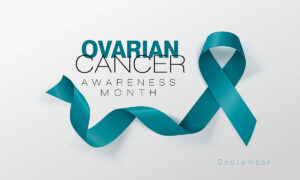Unmasking Ovarian Cancer: A Journey of Awareness and Empowerment

Story by Jeanie Edgmon
Some battles are fought quietly, away from the spotlight, but their impact is profound. One such battle is being fought against ovarian cancer, the second most common type of female reproductive cancer in the United States and has the highest mortality rate of any gynecological cancer. September is ovarian cancer awareness month, and Healthy Kansas City spoke with Dr. Tony Moulton of The Women’s Healthcare Group in Overland Park to discuss the importance of women’s wellness checks in assessing one’s risks for ovarian cancer.
Understanding Ovarian Cancer
Ovarian cancer is a complex disease that occurs when abnormal cells in the ovaries grow and multiply uncontrollably. This can lead to the formation of tumors, which may be benign (non-cancerous) or malignant (cancerous).
 “Ovarian cancer often goes undetected until it is in its advanced stages. Epithelial ovarian cancer is commonly detected in an advanced stage (stage III or IV),” explains Dr. Moulton.
“Ovarian cancer often goes undetected until it is in its advanced stages. Epithelial ovarian cancer is commonly detected in an advanced stage (stage III or IV),” explains Dr. Moulton.
Because the ovaries are tucked deep within the abdomen, symptoms often go unnoticed in the early stages, making early detection a challenge. This has led to ovarian cancer being dubbed the “silent killer.”
“Most women who are diagnosed with ovarian cancer do not have any significant risk factors. However, several risk factors that have been associated with an increased risk include age (55 years or older), family history of breast, ovarian, colon, or endometrial cancer, mutations in BRCA1 and BRCA 2, and never having had children or a history of infertility.”
Making matters even more complicated, there is not a universal reliable screening test for the early detection of ovarian cancer that reduces mortality in asymptomatic women, Dr. Moulton explains.
“Transvaginal ultrasounds have been evaluated as a potential screening tool for the early detection of ovarian cancer. Several studies have concluded that the detection of cancer was low and may result in unnecessary surgery. Additionally, Cancer Antigen 125 serum tumor marker (CA 125) is elevated in approximately 80% of women with epithelial ovarian cancer but can also be falsely elevated,” he added.
The Importance of Well-Woman Checks
Because there is no known way to prevent ovarian cancer, and we have not yet developed a universal reliable screening test for its early detection, yearly well-checks become very important.
“We need to encourage our patients, family, and friends to schedule yearly well-woman checks so their physicians can assess risks. Many women believe that if they have had a pap smear recently, they are up to date on their woman’s health, but this isn’t so. Having a complete wellness check can help update family history, connect the dots, and identify factors that a patient may otherwise dismiss.”
Dr. Moulton elaborated on a recent trend in delaying regular well-exams.
“Over the last several years people have not stayed up to date on annual screenings. Likely because since COVID, we’ve become accustomed to staying home. Again, we need to encourage patients to come in so their physicians can determine risks and have the opportunity to detect and intervene before it becomes a serious prognosis,” he added.

Know the Signs
The key to early detection lies in recognizing the subtle signs that ovarian cancer may present and acting on them. Symptoms such as persistent bloating, abdominal or pelvic pain, difficulty eating, feeling full quickly, and frequent urination should never be dismissed. While these symptoms can also be caused by other conditions, it’s crucial to consult a healthcare professional if they persist for more than a few weeks, especially if they’re accompanied by a change in bowel habits or unexplained weight loss.
Breaking the Silence
 Ovarian cancer doesn’t discriminate—it affects women from all walks of life. Raising awareness is a collective effort that involves breaking the silence surrounding the disease and encouraging regular screenings. By openly discussing ovarian cancer, we shatter the stigma that often accompanies conversations about women’s health. Friends, family members, and healthcare professionals all play a role in fostering an environment where dialogue and support are encouraged.
Ovarian cancer doesn’t discriminate—it affects women from all walks of life. Raising awareness is a collective effort that involves breaking the silence surrounding the disease and encouraging regular screenings. By openly discussing ovarian cancer, we shatter the stigma that often accompanies conversations about women’s health. Friends, family members, and healthcare professionals all play a role in fostering an environment where dialogue and support are encouraged.
Ovarian cancer is a formidable foe, but working together toward greater awareness and increased screenings can decrease its devastating impact. Healthy Kansas City encourages our readers to learn more and encourages all women to reach out to their healthcare providers to schedule yearly well-checks.







